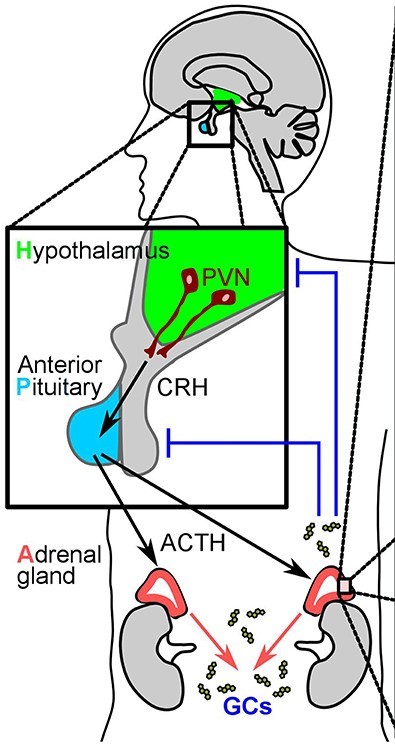Introduction
Hormones are chemical substances that are released by ductless glands directly into the bloodstream. Although they are immediately released into the blood, only their intended target organs are affected. There are various hormones present in the body and all of them are controlled by the hypothalamus and hence it is known as the master gland. Adrenocorticotropic hormone, or ACTH, also known as corticotropin is synthesized and secreted by the anterior pituitary gland and its targets are the adrenocortical cells in the adrenal gland. It is responsible for the release of glucocorticoid hormones, some sex hormones, and various other cellular pathways.
Synthesis
Synthesis of the ACTH hormone takes place in the basophilic cells of the anterior pituitary gland. It is generated from a molecule known as Pre-proopiomelanocortin or pre-POMC. This molecule signals the formation of a 241-amino-acid polypeptide POMC. This POMC undergoes various translational modifications and is ultimately cleaved by endopeptidases which yield a variety of polypeptide fragments including ACTH hormone.
Control mechanism
- The hypothalamus, the adrenal gland, and the pituitary gland are collectively known as the hypothalamic-Pituitary-Adrenal axis and are responsible for the secretion of ACTH in the body.
- Low levels of cortisol in blood– When the level of blood cortisols are lower than normal, then the hypothalamus is triggered and it secretes corticotropin releasing hormone which in turn signals the pituitary gland to release ACTH in blood.
- High levels of cortisol in blood- The elevated levels of cortisols in the blood is detected by adrenal gland receptors. This increased level of hormone inhibits the secretion of corticotropin releasing hormone, which in turn reduces the secretion of ACTH from the pituitary gland. This process is known as the negative feedback mechanism and is responsible for maintaining the blood cortisol levels in the body.

Functions
ACTH in the body has various important functions such as-
- ACTH stimulates the adrenal cortex for production hormones, particularly glucocorticoids.
- It helps in the uptake of lipoproteins which in turn increases the availability of cholesterol in the adrenal cortex cells.
- It helps in the regulation of metabolism, bone reabsorption, protein catabolism, hyperglycemia and lipolysis.
- It also stimulates the secretion of other hormones for the synthesis of androgens which aids in spermatogenesis.
- ACTH release activates the adenylyl cyclase enzyme in the cell membranes which produces cAMP, this cAMP is used in various cellular pathways.
ACTH Disorders
ACTH disorders occur due the presence of tumours near the pituitary glands, malfunctioning of the adrenal gland, congenital diseases, hypopituitarism, genetic or hereditary disorders etc.
Excess of ACTH causes-
- Obesity in the upper body.
- Accumulation of fat near throat region
- Stretch marks, in abdomen, thigh etc.
- Men’s diminished libido and women’s irregular menstrual cycles.
Low level of ACTH cause-
- Anorexia, or a loss of appetite.
- In the affected people, low blood sugar and potassium levels may be seen.
- Females may notice less hair growth in the pubic and armpit areas.
- Different emotional reactions such as depression and psychosis are observed.
Summary
From the above article, we learn about the synthesis of ACTH, its functions, and the diseases brought on by the body’s inappropriate amounts of this hormone. The aforementioned parts teach us about the importance of the ACTH hormone. It is a crucial hormone that triggers the release of other essential adreno-cortical steroid hormones, such as cortisol, which is in charge of the body’s metabolism and particularly the body’s reaction to stress.
Frequently Asked Questions
1. Define catabolism and anabolism.
Ans: The process of converting complex molecules into simpler ones is referred to as catabolism. Energy is eventually released from the process. On the other hand, anabolism entails the joining of smaller molecules to create a larger and more complicated molecule. Energy is required for this procedure.
2. Give the two main types of hormones found in the human body?
Ans: In general, there are two sorts of hormones.Peptide hormones -they are made of amino acids and are soluble in water. For eg-Insulin.Steroid hormones that are fat soluble are the second category. Examples include sex hormones.
3. What is produced by the medulla of the adrenal gland?
Ans: Adrenaline and noradrenaline, are the main hormones secreted by the medulla area of the adrenal gland,and which are involved in the body’s flight or fight response.
 Mission Statement
Mission Statement
“Empower every student to achieve full potential”
88Guru has been established with the social objective of making quality video-based learning material available to all Indian students. Technology, Connectivity and Social Media are rapidly changing the world of Education and we wish to lead the transformation of the tuition industry in India.
88Guru is the perfect complement to the current tuition model. 88Guru creates a wonderful opportunity for children and parents to bond while engaging in a valuable learning activity. It also provides the complete curriculum at your fingertips for those moments when you need some help at short notice. We believe that this mode of tuition could be transformational, adding hours to a child's day while providing complete control over the learning process.
Every course is taught by the best teachers from India's top schools and conducted in an engaging manner to keep students involved. The e-learning process consists of video-based instructions, computer-graded assignments, and a dashboard which allows the student and parent to track progress.


